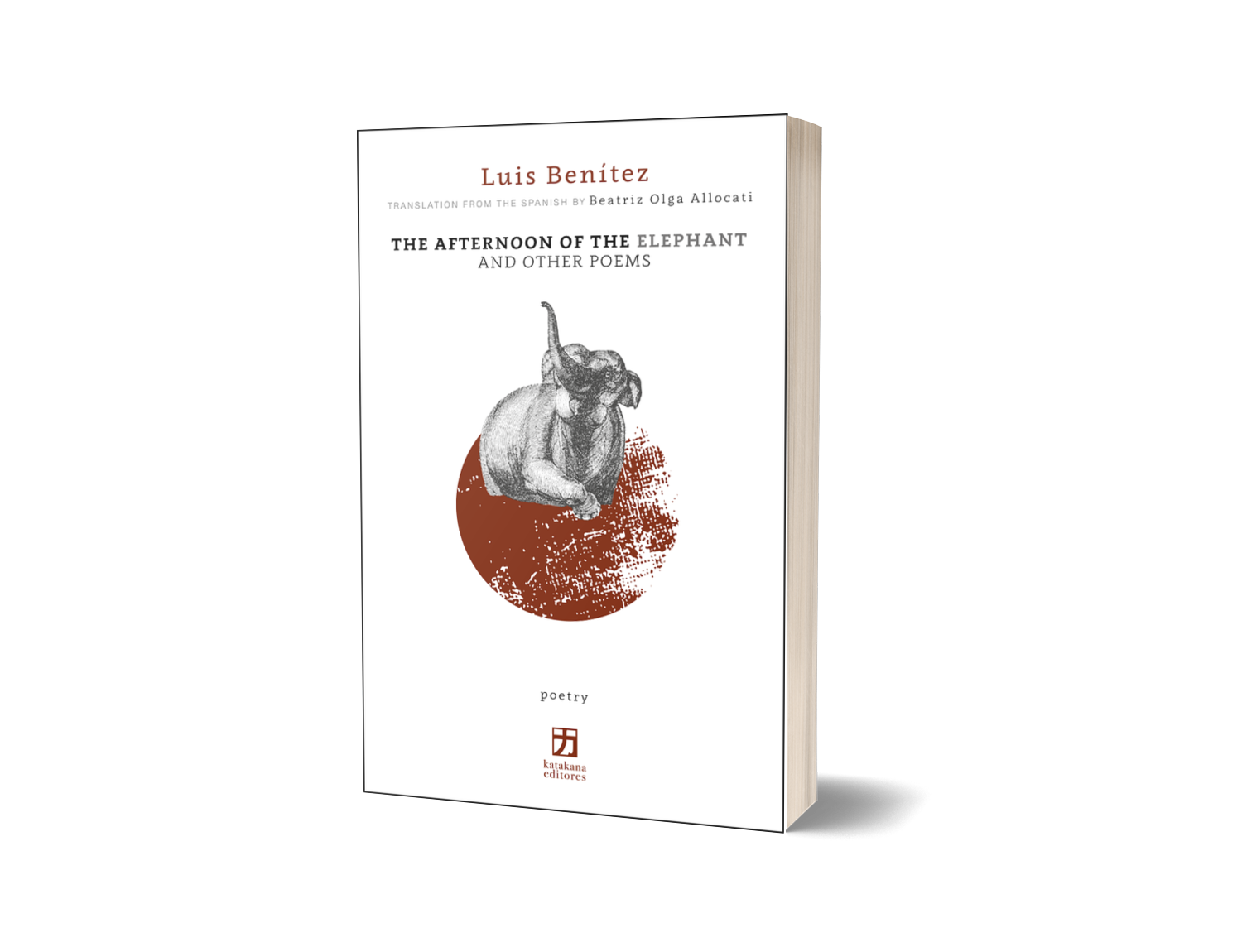THE AFTERNOON OF THE ELEPHANT
To my friend, poet Nicholas Stix,.
wherever he is.
do you remember, nick, the afternoon of the elephant?
you were overwhelmed by the endless rejection
that married woman a mother of four children
had dealt you over the telephone
the only thing she was giving you for
eleven years then
at least
when she was single she said it to your face
and you were irritated really angry
because I had arrived one hour later
and left you alone in huge new york
one more hour to yourself
neither my taxi nor my apologies soothed
your anglo-saxon rage
you said one is alone only in big cities
do you remember, nickie, the afternoon of the elephant?
many rains and snows and footsteps
of italian shoes and sport shoes
passed by that corner in the village
but it hasn’t yet forgotten the afternoon of the elephant
you lectured me in your icy english
without realizing that I was also wrecked
and then that huge shadow
you spoke of the tediousness of cities
of the yellow weariness that sets
to the west of your brooklyn bridge
and of the young women crossing alone
and in buses the silky mazes of central park
heading for those rooms where heating fails them
and then those majestic footsteps
you went on saying they had not included you in that anthology
and said that her husband was bald
lisping and he designed comics
the fool of comics you repeated
the fool of children magazines you repeated
while people
always alert people
ran off the sidewalks
knocked chairs down
and forgot the children in their mad race
you said routine is an old blind lady
begging for coins along bond street and harlem
and that everyone allows her into their houses
then that fat one the bulk
stayed put near our table
in the deserted corner while the cashier
trembling called the police
five thousand kilograms of peaceful forest
crushing the asphalt an immense gray epiphany
four meters high and that funny trunk
with a finger at the end
that tasted fruit from the fallen tables
and hurled the stained tablecloths in amusement
crushed during its escape from some circus or zoo
that old lady beggar who saddens
the oppressed people at home
would look fearlessly at us like all things that
smilingly repeat I am man’s friend.
BIRTH OF THE TANGO
The vertical moon that takes dawn away
and that saw so many things arise and captivate,
the sea condensing in the River Plate,
the street you forgot to name when later,
you added words to the music,
heard you coming out of the blue maybe in a flute
that stopped in amazement, perhaps
in somebody’s absent-minded melody.
Of what whisper and beat, of what whistling without direction,
of what cadence of steps along what spent streets
was tango born, of what silence of lonely men?
The black muzzle and the bitter Creole
that said good-bye to their time
and the poor fair-haired people getting off the ships
and the country in town, with the tenderness
and pain and night and awe
were your cradle and your first steps.
Someone heard the destination of a few chords
lost in the paths of other harmonies
and gathered them turned into the first milonga.
It lulled, wicked madonna, in its arms
your youngest tear, tango.
Born of woman, just like men.
A GENTLE SNAKE
Condescending, gentle enough
to show me its long back,
the deep beauty of its igneous scales
still burning of summer under the April cold.
I had lost myself in my own whirlpools
that surrounded the frozen field
and naïve, as all our silly problems
believed at least to cover the surface
of everything that delivered by us fits
the political division of all creation.
An indifferent gem before my stupid problems,
it cried to me and whispered I am the alpha and the omega and also
this simple snake and how much, in effect, I am:
I felt understood in the simple gesture of its rolling tongue.
Between both fields it placed
the absolute curve of its favorite sign,
the avid interrogation that it appeared to be, was:
its skinny body drew a mute question,
and everything that around me consisted of the question itself
that the snake’s sign enclosed
before the wise god.
From the poetry book: THE AFTERNOON OF THE ELEPHANT AND OTHER POEMS. Luis Benítez. katakana editores 2020

LA TARDE DEL ELEFANTE
A mi amigo, el poeta Nicholas Stix,
en donde sea que esté.
¿recuerdas, nick, la tarde del elefante?
tú estabas abrumado por el enésimo rechazo
que esa mujer casada madre ya de cuatro hijos
te había propinado por teléfono
lo único que te daba desde hacía
entonces once años
al menos
cuando era soltera te lo decía en la cara
y estabas irritado de veras enojado
porque llegué una hora tarde
y te dejé solo en la enorme nueva york
por otra hora más entregado a ti mismo
ni mi taxi ni mis disculpas calmaron
tu rabia anglosajona
decias sólo se está solo en las grandes ciudades
¿te acuerdas, nickie, de la tarde del elefante?
muchas lluvias y nieves y pisadas
de zapatos italianos y de zapatos deportivos
pasaron por esa esquina del village
pero ella no ha olvidado todavía la tarde del elefante
tú me sermoneabas en tu álgido inglés
sin darte cuenta de que yo también estaba derrumbado
y entonces esa enorme sombra
hablabas del tedio de las ciudades
del aburrimiento amarillo que se pone
al oeste del puente de tu brooklin
y de las mujeres jóvenes que cruzan solas
y en ómnibus los laberintos sedosos de central park
rumbo a esos cuartos donde la calefacción les falla
y entonces esas pisadas majestuosas
hablabas de que no te habían incluido en esa antología
y decías que el marido de ella era calvo
seseoso y que dibujaba historietas
el tonto de los cómics repetías
el tonto de los tebeos repetías
mientras la gente
siempre está alerta la gente
dejaba corriendo la acera
tumbaba las sillas
y olvidaba a los niños en su loca carrera
decías que la rutina es una vieja ciega
que mendiga monedas por bond street y por harlem
y que cada persona la recibe en su casa
entonces ese gordo la mole
se quedó parado cerca de nuestra mesa
en la esquina desierta mientras el cajero
temblando llamaba a la policía
cinco mil kilogramos de pacífica selva
aplastando el asfalto una inmensa epifanía gris
de cuatro metros de alto y esa trompa curiosa
con un dedo en la punta
que probaba las frutas de las mesas caídas
y revoleaba jugando los manteles manchados
aplastó en su huida de algún circo o del zoo
a esa vieja mendiga que a la gente oprimida
acongoja en su casa
nos miraba sin miedo como todas las cosas
que sonriendo repiten soy amigo del hombre
NACIMIENTO DEL TANGO
La luna vertical que se lleva el alba
y que vio surgir y enajenar a tantas cosas,
el mar que se condensa en el Río de la Plata,
la calle que olvidaste nombrar cuando después,
a la música, agregaste las palabras,
te oyeron salir de la nada quizás en una flauta
que se detuvo asombrada, tal vez
en la melodía distraída de alguno.
¿De qué susurro y latido, de qué silbido sin rumbo,
de qué cadencia de pasos por qué calles apagadas
nació el tango, de qué silencio de hombres solos?
El negro bozal y el criollo amargo
que despedían su tiempo
y los rubios pobres que bajaron de los barcos
y el campo en la ciudad, con la ternura
y el dolor y la noche y el espanto
fueron tu cuna y tus primeros pasos.
Alguien oyó el destino de unos acordes
perdidos en los rumbos de otras armonías
y los reunió convertidos en la primera milonga.
Ella acunó, madonna maleva, en sus brazos
tu lágrima más joven, tango.
Nacido de mujer, como los hombres.
UNA SERPIENTE GENTIL
Condescendiente, tuvo la gentileza
de mostrarme su larga espalda,
la belleza profunda de sus ígneas escamas
todavía ardientes de verano bajo el frío de abril.
Yo me había perdido en mis propias espirales
que rodeaban el campo congelado
e ingenuas, como todos nuestros bobos problemas
creían como mínimo abarcar la superficie
de cuanto repartido por nosotros conforma
la política división de toda la creación.
Ella, una gema indiferente ante mis estúpidos problemas,
me gritó y susurró soy el alfa y el omega y también
esta simple serpiente y cuanto soy en efecto:
me sentí comprendido en el simple ademán de su lengua ondulante.
Entre ambos campos se colocó
la absoluta curva de su signo favorito,
la ávida interrogación que parecía, era:
su magro cuerpo trazó una muda pregunta,
y todo cuanto me rodeaba consistía en la pregunta misma
que el signo de la serpiente cerraba
ante el sapiente dios.
© All rights reserved Luis Benítez
 Luis Benítez nació en Buenos Aires el 10 de noviembre de 1956. Es miembro de la Academia Iberoamericana de Poesía, Capítulo de New York, (EE.UU.) con sede en la Columbia University, de la World Poetry Society (EE.UU.); de World Poets (Grecia) y del Advisory Board de Poetry Press (La India). Ha recibido numerosos reconocimientos tanto locales como internacionales, entre ellos, el Primer Premio Internacional de Poesía La Porte des Poètes (París, 1991); el Segundo Premio Bienal de la Poesía Argentina (Buenos Aires, 1992); Primer Premio Joven Literatura (Poesía) de la Fundación Amalia Lacroze de Fortabat (Buenos Aires, 1996); Primer Premio del Concurso Internacional de Ficción (Montevideo, 1996); Primo Premio Tuscolorum Di Poesia (Sicilia, Italia, 1996); Primer Premio de Novela Letras de Oro (Buenos Aires, 2003); Accesit 10éme. Concours International de Poésie (París, 2003) y el Premio Internacional para Obra Publicada “Macedonio Palomino” (México, 2008). Ha recibido el título de Compagnon de la Poèsie de la Association La Porte des Poètes, con sede en la Université de La Sorbonne, París, Francia. Miembro de la Sociedad de Escritoras y Escritores de la República Argentina. Sus 36 libros de poesía, ensayo, narrativa y teatro fueron publicados en Argentina, Chile, España, EE.UU., Italia, México, Suecia, Venezuela y Uruguay
Luis Benítez nació en Buenos Aires el 10 de noviembre de 1956. Es miembro de la Academia Iberoamericana de Poesía, Capítulo de New York, (EE.UU.) con sede en la Columbia University, de la World Poetry Society (EE.UU.); de World Poets (Grecia) y del Advisory Board de Poetry Press (La India). Ha recibido numerosos reconocimientos tanto locales como internacionales, entre ellos, el Primer Premio Internacional de Poesía La Porte des Poètes (París, 1991); el Segundo Premio Bienal de la Poesía Argentina (Buenos Aires, 1992); Primer Premio Joven Literatura (Poesía) de la Fundación Amalia Lacroze de Fortabat (Buenos Aires, 1996); Primer Premio del Concurso Internacional de Ficción (Montevideo, 1996); Primo Premio Tuscolorum Di Poesia (Sicilia, Italia, 1996); Primer Premio de Novela Letras de Oro (Buenos Aires, 2003); Accesit 10éme. Concours International de Poésie (París, 2003) y el Premio Internacional para Obra Publicada “Macedonio Palomino” (México, 2008). Ha recibido el título de Compagnon de la Poèsie de la Association La Porte des Poètes, con sede en la Université de La Sorbonne, París, Francia. Miembro de la Sociedad de Escritoras y Escritores de la República Argentina. Sus 36 libros de poesía, ensayo, narrativa y teatro fueron publicados en Argentina, Chile, España, EE.UU., Italia, México, Suecia, Venezuela y Uruguay
